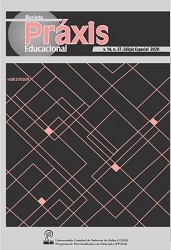SOCIO-PSYCHOLOGICAL ISSUES OF CHANGING VALUES IN ADOLESCENTS - YOUTH IN EDUCATION
DOI:
https://doi.org/10.22481/praxisedu.v16i37.6406Palavras-chave:
Educação, Adolescente-jovem, Sistema de valores, Questões sócio-psicológicasResumo
O artigo estuda as questões sócio-psicológicas da mudança de valores em adolescentes - jovens em educação. A pesquisa foi realizada com o adolescente-jovem e seus pais; seguiu-se a dinâmica da mudança de valores. A pesquisa mostrou que os valores importantes durante a comparação da compatibilidade dos valores dos pais com os valores dos adolescentes-jovens que vivem na cidade e região dominam diretamente alguns valores. Mas, entre esses valores, destacam-se o conservadorismo, a abertura a inovações, a autoconfirmação e a auto-realização. O fator de importância entre esses valores é a tendência caracterizada e fundamentalmente não difere uma da outra. O fator de importância mostra-se apenas na direção da autorrealização (no nível de p = 0,046, r = 6,146 *). Essa mudança mostra que os jovens ou os adolescentes preferem mais valores de autoconfirmação comparando os anos anteriores na educação. Considerando isso, recomenda-se criar uma condição para a autorrealização de seus sujeitos na educação.
Downloads
Referências
Jabbarov R.(2017). Factors affecting the development of self-realization among students of different professions. Science and Education, 9, 75-87. 10.24195/2414-4665-2017-9-12.
Jabbarov R.; Mustafayev, M ; Kazimova, K ; Valiyeva, Y (2018) .FACTORS AFFECTING STUDENTS' PROFESSIONAL IDENTITY, .SCIENCE AND EDUCATION, DoI: 10.24195/2414-4665-2018-1-5
Barney, D. (2009). Trasmettere valori. Tre generazioni familiari a confronto [Transmittig values. A comparison between three family generations]. Milano: Unicopli. (in Italian)
Barney, D., Ranieri, S., Scabini, E., & Rosnatiet, R. (2011). Value transmission in the family: do adolescents accept the values their parents want to transmit? Journal of Moral Education, 1(40), 105-121.
Berry, J. W., Poortinga, Y. H., Segall, M. H., & Dasen, P. R. (1992). Cross-cultural psychology: Research and applications. New York: Cambridge University Press.
Boehnke, K. (2001). Parent-offspring value transmission in a societal context: Suggestions for a utopian research design with empirical underpinnings. Journal of Cross-Cultural Psychology, 32, 241-255.
Boehnke, K., Hadjar, A., & Baier, D. (2007). Parent-child value similarity: The role of Zeitgeist. Journal of Marriage and Family, 69, 778-792.
Cohen, S., Doyle, W., & Alper, C.(2009): Sleep Habits and Susceptibility to the Common Cold. Archives of Internal Medicine; 169(1): 62-67.
Carl Lamote &Nadine Engels (2010). The development of student teachers’ professional identity. Explore European Journal of Teacher Education, 3-18.
Fuligni, A., & Zhang, W. (2004). Attitudes toward family obligations among adolescents in contemporary urban and rural China. Child Development, 74, 180-192.
Kuczynski, L., & Navara, G. S. (2006) Sources of innovation and change in socialization, internalization and acculturation. In M. Killen & J. G. Smetana (Eds.), Handbook of moral development (pp. 299-327). Mahwah, NJ: Lawrence Erlbaum Associates.
Roest, A. M. C., Dubas, J. S., & Gerris, J. R. M. (2009). Value tran¬smissions between parents and children: gender and developmental phase as transmission belts. Journal of Adolescence, 33(1), 21-31.
Schonpflug, U. (2001). Intergenerational transmission of values: The role of transmission belts. Journal of Cross-Cultural Psychology, 32, 174-185.
Schwartz, S. H. (2014). National culture as value orientations: Con¬sequences of value differences and cultural Distance. In V. A. Ginsburgh & D. Throsby (Eds.), Handbook of the economics of art and culture (Vol. 2, pp. 547-586). Amsterdam: Elsevier.
Schwartz, S., Butenko, T. P., Sedova D. S., & Lipatova, A. S. (2012). A refined theory of basic personal values: validation in Russia. Psychology. Journal of Higher School of Economics, 9(2), 43-70.
Steca, P., Monzan, D., Greco, A., & D'Addario, M. (2012). Similarity in self-enhancement and self-transcendence values between young adults and their parents and friends. Family Science, 1(3), 34-45.
Swader, C. S. (2013). The capitalist personality: Face-to-face sociality and economic change in the post-communist world. New York: Routledge.
Trommsdorff, G. (2009). Intergenerational relations and cultural transmission. In U. Schonpflug (Ed.), Cultural transmission. Psychological, developmental, social, and methodological aspects (pp. 126-160). New York: Cambridge University Press.
Vedder, P., Berry, J., Sabatier, C., & Sam, D. (2009). The intergenerational transmission of values in national and immigrant families: The role of Zeitgeist. Youth Adolescence, 38, 642-653.
Mudrik, A. V. (2000). The main components of mesofactors influence on socialization of man. In V. A. Slastenin (Ed.), Social pedagogy, pp. 31-50). Moscow: Academy
Yadov VA (2007) Sociological strategy of socialization. M.: Omega-L, 2007, 567 p.
Downloads
Publicado
Edição
Seção
Licença
Você é livre para:
Compartilhar - copia e redistribui o material em qualquer meio ou formato; Adapte - remixe, transforme e construa a partir do material para qualquer propósito, mesmo comercialmente. Esta licença é aceitável para Obras Culturais Livres. O licenciante não pode revogar essas liberdades, desde que você siga os termos da licença.
Sob os seguintes termos:
Atribuição - você deve dar o crédito apropriado, fornecer um link para a licença e indicar se alguma alteração foi feita. Você pode fazer isso de qualquer maneira razoável, mas não de uma forma que sugira que você ou seu uso seja aprovado pelo licenciante.
Não há restrições adicionais - Você não pode aplicar termos legais ou medidas tecnológicas que restrinjam legalmente outros para fazer qualquer uso permitido pela licença.












